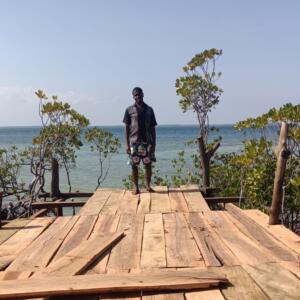Crab Farming in Faza Ward– Final Report
In October 2022, Faza Youth Action Group started their mangrove Conservation project through Crab Farming. The project aimed to engage and encouraging communities to stop doing mangrove degrading activities by presenting an alternative income-generating activity of crab farming.
Now 6 months into the project, we want to share how it has developed.
Project Summary
The project is made up of community awareness and sensitization sessions and setting up the first crab farming site in Pate. Communities will be taught the importance of mangrove conservation, the benefits gained from protecting the mangroves and techniques that could be used to conserve and protect mangroves
A second aspect of this project is to mobilise the community to clear waste from the area of mangroves where the farming will take place. Moving forward, these areas are to be maintained and free from plastics and other waste. Within the plastic free zones is where communities will be supported to harvest mangrove seedlings and crabs for income generations.
Environmental Challenges Facing Mangrove Forests
- Over-exploitation of mangrove trees for economic purposes due to urbanisation, industrialisation, and discharge of domestic sewage and pesticides.
- Other human impacts such as dredging have led to mangrove erosion and habitat destruction.
- Lack of community understanding of the value and benefit of mangrove ecosystems and the urgency of rehabilitation efforts
- Local involvement in mangrove management and conservation is not optimal
- High rates of population growth and greater economic needs have caused land uses to change leading to encroachment on mangrove forests.
Project Desired Outcomes
The expected outcomes of the project were:
- Establish two crab farming locations.
- Offer livelihood training to women and youths from the mangrove-dependent community.
- Ensure access to markets for crabs harvested from the mangroves.
- Encourage stronger inter-agency coordination at the local level and strengthen government and CSOs cooperation on environmental matters.
- Protect the local environment in the selected village sites through reforestation of mangroves in the degraded areas.
- Protect inland vegetation against salinization by acting as a ground water pump to prevent the incursion of the saline ground water into the freshwater aquifer.

Outcomes Achieved
- Collection of 2.3 tons of plastic at the village level and at the crab farming site.
- The creation of a plastic free zone at the crab farming site.
- A new protected area of mangroves where communities have agreed not to degrade or cut mangroves within that area. The organisation was able to establish a mangrove nursery of 1000 seedlings of 3 varied species around the crab farming area totalling 3000 seedlings.
- There is now increased knowledge and advocacy in mangrove restoration and protection at the village level leading to increased interest from the community in the protection and sustainable usage of mangroves.
- Increased participation in mangrove protection sessions and platforms through village meetings and plastic collection at village level.
- 40 cages have been constructed to start crab farming. This will spearhead protection of the mangroves in the area.
- 2 bandas (Shades) have been constructed to be used as an information centre and a camp for the crab farming. This ensures continuity of awareness programs training of mangrove knowledge to the community and stakeholders.
- A boardwalk is under construction at the crab farming site which is to help attract tourists into site visit and are in collaboration with Theflipflopi to produce plastic boards for the boardwalk
Next Steps
The project is at its final stages and has launched their crabs’ cages for their crab farming they are expecting their first harvest in 3 to 6 months.
The project will be focusing on monitoring and evaluation to ensure that the projects’ objectives are implemented and sustained.
There will be a continuous engagement with the communities on plastic waste reduction to maintain a free plastic zone at the crab farming site and to implement the same in the communities in the long term.
Community awareness programs on importance of mangrove management and conservation will continue, to keep the communities engaged and encouraged to look into alternative activities rather than go back to logging and degrading mangroves forests.
